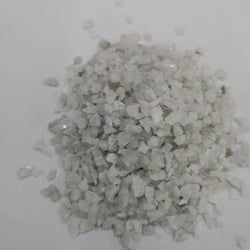Microsilica - Product
Microsilica, also known as Silica Fume, is a byproduct of the silicon and ferrosilicon production process. It consists of very fine, amorphous silicon dioxide (SiO₂) particles that are collected from the flue gases of electric arc furnaces. Microsilica is used as a supplementary cementitious material in concrete and other applications due to its high pozzolanic reactivity and particle fineness.
- Product Category: Abrasive & Material
- Key Features:
- Fine Particle Size: Microsilica particles are extremely fine, typically ranging from 0.1 to 1.0 micrometers, providing a high surface area for chemical reactions.
- High Pozzolanic Reactivity: Reacts with calcium hydroxide in cement to form additional calcium silicate hydrate, improving the strength and durability of concrete.
- Enhanced Durability: Improves the durability and resistance of concrete to environmental factors such as moisture, chemicals, and high temperatures.
- Low Bulk Density: The fine particles result in a low bulk density, which can enhance the workability and consistency of concrete mixtures.
Applications:
Concrete: Used as a supplementary cementitious material in concrete to enhance strength, durability, and workability. Commonly applied in high-performance concrete, self-compacting concrete, and in applications requiring resistance to aggressive environments.
Refractories: Employed in refractory materials to improve thermal stability and resistance to high temperatures.
Mortars and Grouts: Added to mortars and grouts to enhance their performance, including strength, adhesion, and resistance to chemical attack.
Ceramics: Used in the manufacture of ceramics and advanced materials to improve properties such as strength and thermal resistance.
Industrial Coatings: Incorporated into industrial coatings to enhance performance characteristics like abrasion resistance and durability.
Technical Specifications:
Chemical Composition: High-purity silicon dioxide (SiO₂), typically ≥ 85% SiO₂
Particle Size: Typically ranges from 0.1 to 1.0 micrometers
Density: Approximately 2.0-2.5 g/cm³
Specific Surface Area: High specific surface area, contributing to its pozzolanic reactivity
Moisture Content: Typically < 1%
Advantages:
Enhanced Concrete Properties: Improves the strength, durability, and workability of concrete and other cementitious materials.
Improved Durability: Provides resistance to chemical attacks, moisture, and high temperatures, extending the lifespan of concrete structures.
High Reactivity: The fine particle size and high reactivity ensure effective performance in a variety of applications.
Versatility: Suitable for use in a wide range of applications, from construction and refractories to coatings and ceramics.
Packaging:
Available in various packaging options, including 25 kg bags, 500 kg bulk bags, or according to customer specifications.Storage:
Store in a dry, cool place. Ensure containers are tightly sealed to prevent moisture absorption and contamination.
You May Also Like
Provide more details here.
Use text and images to tell your company’s story. Explain what makes your product or service extraordinary.


Provide more details here.
Use text and images to tell your company’s story. Explain what makes your product or service extraordinary.






